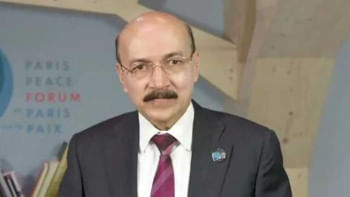Not much effort to keep cricket in Asiad

One piece of news that has slipped under the radar over the past month is the Olympic Council of Asia's decision to drop cricket from the 2018 Asian Games in Jakarta. Cricket was played in the Asian Games for the first time in 2010 in Guangzhou, where Bangladesh defeated Afghanistan to win gold -- the country's only top-place finish in the Games. In Incheon 2014, the Bangladesh men's team won bronze in the event while the women picked up their second consecutive silver. Bangladesh have won a total of 12 medals in 10 editions, and cricket has contributed four of those from just two Asian Games.
The OCA said on April 20 that cricket, along with some other disciplines, was removed in order to reduce the burden on the Indonesian organisers.
So it is a little surprising that there has been no hue and cry over the expulsion of cricket from the Games, as it is a source of glory for an otherwise medal-starved nation. But quite apart from the Bangladeshi perspective, cricket being dropped from the Asian Games -- the showpiece multisport event of the region most passionate about the game -- should be concerning to the game and its developmental ambitions.
“It may not matter that much to the Test teams, but it is very important to non-Test playing countries,” said Syed Ashraful Huq, Bangladesh's first domestic longer-version double-centurion in the early 1980s and in 2007, as the Asian Cricket Council's (ACC's) CEO, the driving force behind getting cricket featured in Guangzhou. “When they [non-Test playing countries] play cricket in the Games, their federations get grants from their respective Olympic councils, which are used to develop the teams that will participate in the event.”
While spreading the game to new frontiers has always been the party line of the International Cricket Council (ICC), cricket's global governing body has actually started to put its money where its mouth is recently, with ICC chief executive Dave Richardson saying in late March that the time is right for cricket to return to the Olympics in 2024 for the first time since making its Olympics debut in the 1900 Games.
A big part of the reason that cricket had not been part of the Asian Games before 2010 was that the Board of Control for Cricket in India (BCCI) was at odds with the Indian Olympic Association and therefore the bid to have the sport featured in the Games did not have the backing of the financial heavyweight of the cricketing world. That all changed in April 2007, when Sharad Pawar was BCCI president.
“The main objection used to come from India as they did not want to play in the Asian Games or the Olympics,” said Ashraful, who left the ACC in 2015 after a major shakeup left the body with only two officials. “Pawar, unlike his predecessors, was sympathetic to our cause and he said that whether India play or not, we should try and take it into the Games because it will help the other countries.”
WHAT CAN BE DONE
It is helpful to look at how the OCA was convinced in 2007 to understand how the tide can be changed again. It was driven by the ACC, and they had a sympathetic ear in Haider Farman, the Asian Games director then and, fortunately for the chances of getting cricket back in, now.
The removal of BCCI's objection was a crucial aspect. Also, a key argument in convincing the OCA was that cricket would rake in the big bucks from international television audiences.
“The cricket event was the most watched televised event in 2010 and 2014, not in China or in South Korea, but around the world. Such is the passion for the game in the subcontinent that even if an Under-23 India, Pakistan, Bangladesh or Sri Lanka team is sent, their countrymen will watch it,” Ashraful added.
It falls upon the Bangladesh Olympic Association (BOA) to make the effort to change the current status quo. “I do not think the BCB [Bangladesh Cricket Board] can do much in this situation; it is up to the BOA to take some action. The BCB can maybe put pressure on the BOA, but it is up to the BOA to act and [Syed] Shahed Reza, the secretary-general of BOA, has a working relationship with key OCA members.”
“I have not talked directly to them,” said Reza when contacted. “I sent an email the next day [after it was announced that cricket would not be part of the Asian Games] to the OCA requesting them to keep cricket, but we have not heard back.”
Asked whether the television viewership angle could be used again to influence the decision, Reza said: “I don't think that [influencing the decision] is correct.”
“Look, it is not a matter of gold or silver,” Reza said when the importance of cricket in the Asian Games to Bangladesh was pointed out. “Every country wants gold. It is not up to us to issue directives; we can only request. It depends on the capacity of the organisers, whether they have the venues, etc. Their [OCA's] financial matters are also involved. Maybe there are no suitable grounds in Indonesia; the OCA and the hosts sat together and the OCA made the decision; we don't know why.”
Reza added that it is too early to tell whether it is possible to get cricket back into the fold, but a cursory Google search revealed two cricket grounds -- the GMIS Cricket Ground and the Karawaci Cricket Ground -- with stands in Jakarta, where the Games will be held in October 2018.
It however seems that the intrepid action that resulted in cricket being included the first time around is now missing.


 For all latest news, follow The Daily Star's Google News channel.
For all latest news, follow The Daily Star's Google News channel. 



Comments